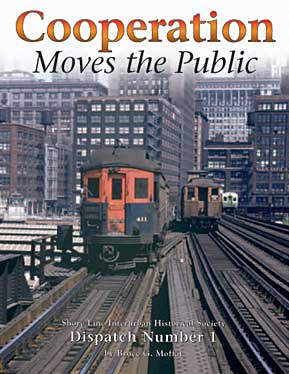Cooperation moves the public
 A plug for the Shoreline Interurban Historical Society's history of the Garfield Park "L".
A plug for the Shoreline Interurban Historical Society's history of the Garfield Park "L".
The first publication in the Dispatch Series is Cooperation Moves the Public, the story of the integrated operations of the Chicago Aurora & Elgin and the Chicago Rapid Transit Company and later the Chicago Transit Authority over the Garfield Park Branch of Chicago's rapid transit system until September 19, 1953. Trains were operated seconds apart "on sight" as there were no signals and no radios. This was a very complex operation, best described as cars of wood operated by men of steel pursuant to a book of rules that included a rule stating that no collision with another train will be excused.We excuse all sorts of train wrecks in Illinois politics today and you'd be hard pressed to find men or women of steel skillfully operating much of anything complex.
The Illinois Campaign for Political Reform's blog found an editorial in The Kankakee Daily Journal suggesting the rule book's flawed.
The first year of the four-year statewide term finds the state's three most powerful Democrats locked in a battle to determine which one of them is really in charge. Leaders do this sometimes, but the check on this bad behavior is usually the other 173 legislators who serve as ballast, pulling their leaders back to more rational positions.So is this a way to run the railroad?
But not this year. While the leaders squabble, the other 173 have been just witnesses. Why? The Kankakee Daily Journal editorialized over the weekend with a list of reasons. And their main focus? The concentration of campaign funds in the Four Tops.
"The leaders get to decide if you will have an opponent who's well-funded -- or none at all. To be competitive in a "targeted" race means $500,000 for a House seat and $1 million for a Senate seat."
Their fixes include a host of campaign finance reforms to end the concentration of money at the top: stop transfers, bar stockpiling of money, eliminate giving by gambling interests. Lastly? Limit donations, to force members to broaden their financial base and reach out to small donors.
Update: STL Today on two of the motormen,
Gov. Rod Blagojevich and House Speaker Michael Madigan have been at it all year. The fight is ostensibly about Blagojevich's quest for a health care initiative, and Madigan's insistence that the state can't afford it.And there's no Kate Shelly in Illinois Politics right now. We really need her 'cause the bridge is out.
But it's clear the conflict also encompasses the different backgrounds, political styles and personalities of two powerful men who need one another to run the state, but who (many believe) can't stand each other.
"It's palpable. Any time those two guys are in the same room, you can feel it," says state Rep. Chapin Rose, R-Mahomet, echoing a common observation in the Capitol. "The hatred, the venom, the seething. … It's real."
xp Bill Baar's West Side
2 comments:
That "Kate Shelly" might have to put his dukes if they seek to bring some order back to Springfield. Especially since we know the governor might fight people who get into his way. I still tend to think Michael Madigan is the most adult down there right now.
Bill,
Neither Fritchey's Bill nor the reforms in the linked article will have the slightest effect on this state.
While they seem worthwhile, on the surface, there is always an out somewhere, and as you will notice, there is never a way to enforce these rules.
The already weak rules are broken with impunity.
"Convention or Bust" isn't a slogan. It's a prediction.
Post a Comment